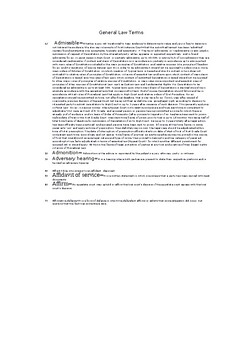Law: One term analytically :''Admissible'' in plain text here not file
- Word Document File
Description
1) . Admissible=Whether a jury will be allowed to hear evidence to determine its value and jury is free to believe or not believe the evidence. We also say in lawsuits of First Instance Court=that the submitted lawsuit has been ‘admitted’ namely found substantial one, acceptable, typically and essentially. -> The term ‘admissible’ or ‘inadmissible’ is also used in submission of request of Cancellation by the interested party, either appealer or appealed respectively, and is found admissible for ex. in penal cases in High Court, or partially admissible, up to 40-50% or above 51% of non admission they are considered inadmissible, if content and claim of Cancellation is in accordance or partially in accordance up to above extent with main rules of Constitution included in the main principles of Constitution, and relative sources, like principle of freedom for ex. and its variations, of source Natural Law. Or in order to be admissible it should not be opposed to orders one or more main orders of Articles of Constitution, on which creation of typical laws, is based and also its content in turn does not contradict to relative rules of principles of Constitution, in terms of essential law and laws upon which content of main claim of Cancellation is based; also the rules of law upon which content of submitted Cancellation is based should not be opposed to other major rules of principles of relative sources of Constitution, or main rules more important and essential ones of principles of other sources of Constitutional Law, such as Custom Law and Fundamental Rights. For Cancellation to be considered as admissible in up to at least 50%, typical laws upon which main Claim of Cancellation is claimed should be in absolute accordance with the essential laws that correspond to them. And of course Cancellation should follow and be in accordance with all rules of Procedural Law that apply in High Court and relative orders of Civil Procedure. For ex. cancellation should be submitted on time, not after final deadline, that is say here for ex. from 1 year after issued of irrevocable previous decision of Appeal Court but being not final as definite one, gives(legal) right according to decision to interested party to submit cancellation to High Court in up to 3 years after issuance of such decision. This generally applying in Penal Law. For ex. in serious crimes, where Appeal Court in its relative composure and type each time is competent to adjudicate ‘this’ case as Court of A’ Grade, and accused person or persons having committed a crime for which there is already prof of evidence, and on basis of Order of Prosecutor (after process to Inquisitor if so, has/have been sent to prison before date of trial in this First Grade Court, maximum time frame of prison prior to trial is up to 18 months, this being half of total time frame of deadline for submission of Cancellation if so to High Court, being up to 3 years totally after legal action has been officially been practiced, and accused persons have been sent to prison. Of course all this time frame, in some penal acts ‘run’ and apply as time of prescription, then definitely say so now, the legal case should be adjudicated within time of total prescription. The date of interruption of prescription officially starts on date of start of trial of First Grade Court competent each time, accordingly and not earlier, time frame of pre-trial, as anything adverse may be proved in the course of Trial that would/could reverse legal nature and type of crime, thus proved to belong to another category of penal act, according to true facts adjudicated in terms of essential law (Appeal Court), for which another different punishment for accused will or should apply. All this in the frame of legal protection of parties at any trial and practice of their (legal) rights in terms of Procedural Law.
One single term here today, in plain text for publication not file


